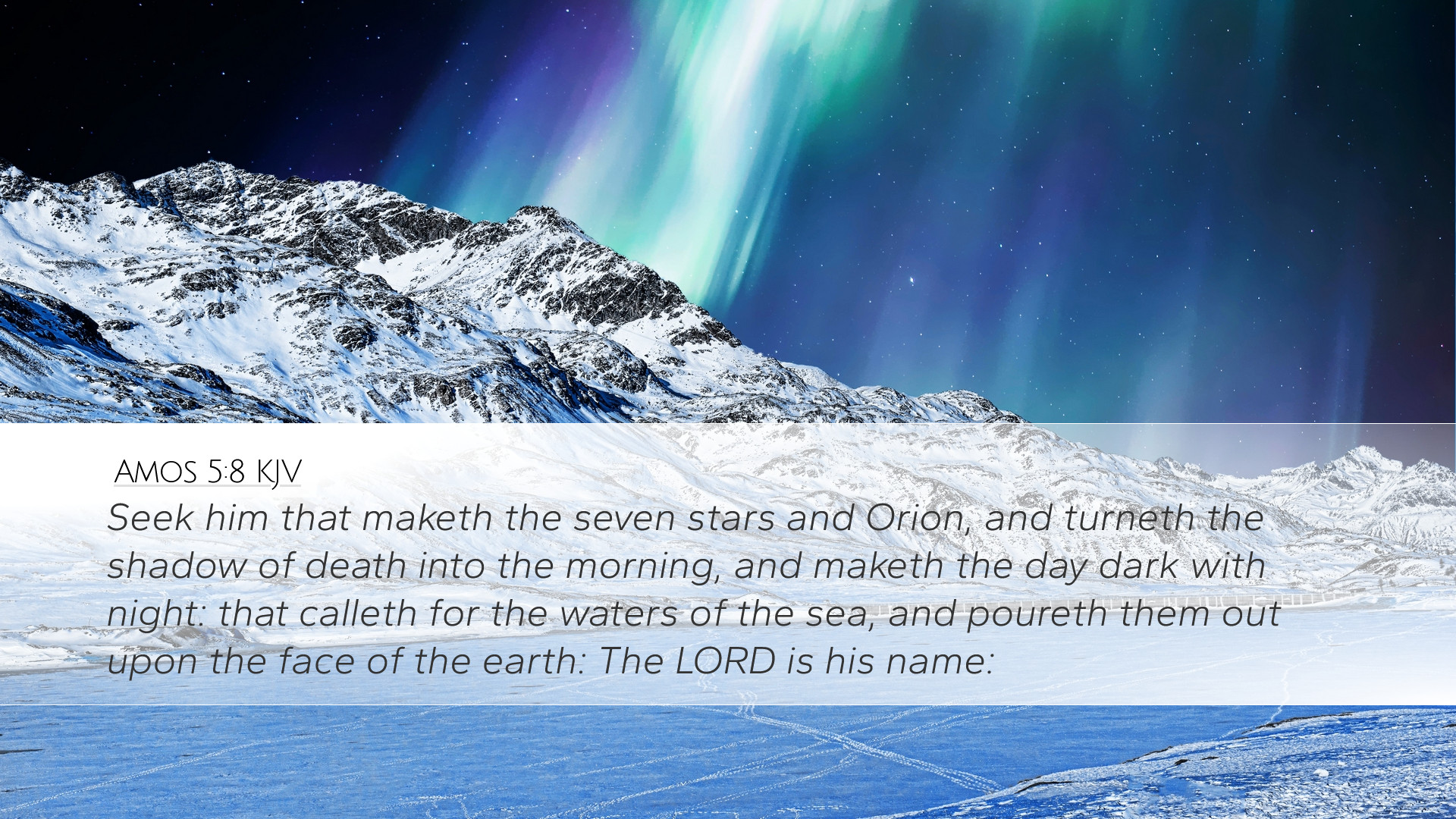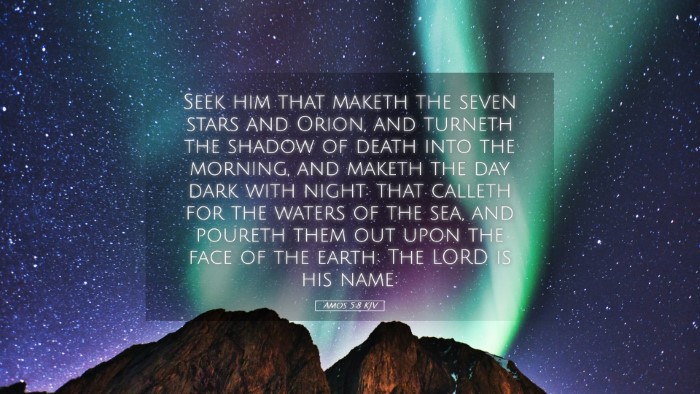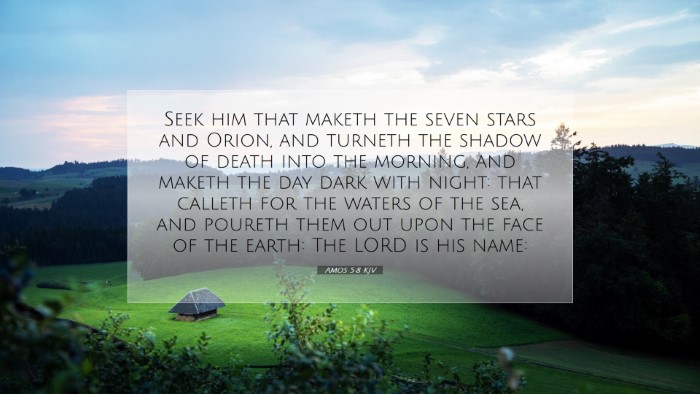Old Testament
Genesis Exodus Leviticus Numbers Deuteronomy Joshua Judges Ruth 1 Samuel 2 Samuel 1 Kings 2 Kings 1 Chronicles 2 Chronicles Ezra Nehemiah Esther Job Psalms Proverbs Ecclesiastes Song of Solomon Isaiah Jeremiah Lamentations Ezekiel Daniel Hosea Joel Amos Obadiah Jonah Micah Nahum Habakkuk Zephaniah Haggai Zechariah MalachiAmos 5:8
Amos 5:8 KJV
Seek him that maketh the seven stars and Orion, and turneth the shadow of death into the morning, and maketh the day dark with night: that calleth for the waters of the sea, and poureth them out upon the face of the earth: The LORD is his name:
Amos 5:8 Bible Commentary
Commentary on Amos 5:8
Amos 5:8 states: "Seek Him that maketh the seven stars and Orion, and turneth the shadow of death into the morning, and maketh the day dark with night: that calleth for the waters of the sea, and poureth them out upon the face of the earth: The Lord is His name."
Introduction
The exhortation found in Amos 5:8 serves as a powerful reminder of God's sovereignty over creation and His desire for His people to seek Him. The passage contrasts the stark realities of life with profound theological truths regarding the character and actions of God. This commentary draws on insights from various public domain sources to elucidate the depth of this verse.
Contextual Analysis
The Book of Amos is set against the backdrop of the Northern Kingdom of Israel during a time of relative prosperity coupled with moral decay. The prophet Amos, a shepherd and fig farmer, speaks out against the injustice and idolatry rampant in society. Chapter 5, where verse 8 is located, emphasizes the futility of religious rituals without genuine righteousness and calls for a return to true worship.
Exegesis of the Verse
In the first part of Amos 5:8, the command to “Seek Him” emphasizes an active pursuit of God. The Hebrew term used here implies not merely a passive seeking but an earnest striving to connect with the Creator. This pursuit is directed toward the one who “maketh the seven stars and Orion.” This reference highlights God's mastery over the cosmos, reminding the reader that He is the architect of the universe.
Stars and constellations hold significant meaning in biblical literature, often symbolizing God's omnipotence and the order He has established in creation. Matthew Henry notes, "The Creator of these celestial bodies, who knows their courses and orders them, is to be sought with reverence and diligence."
The Transformation of Darkness
The verse continues by stating, “turneth the shadow of death into the morning.” This imagery suggests a powerful transition from despair (represented by the shadow of death) to hope (represented by the morning light). Albert Barnes highlights that this transformation is indicative of God's ability to change the direst circumstances into opportunities for renewed life.
This metaphor captures the essence of repentance and divine restoration. It speaks to the heart of the gospel message that in Christ, the darkest moments can give way to the hope and light of a new day. Adam Clarke elaborates, stating, "The Lord can bring comfort and joy from the deepest sorrows and challenges."
The Sovereignty of God
Amos 5:8 further illustrates God’s sovereignty by proclaiming He “maketh the day dark with night.” This duality reinforces the idea that God is in control of both light and darkness, a theme that resonates throughout Scripture. The expression highlights that even in times of trouble, believers are encouraged to trust in God's overarching narrative.
Clarke reflects on this sovereignty, stating, "God's omnipotent governance extends to every aspect of life, reminding us that nothing escapes His awareness nor influence."
Nature and Providence
In the latter part of the verse, “that calleth for the waters of the sea, and poureth them out upon the face of the earth,” depicts God's command over nature. The imagery of calling forth waters conveys God's authority over the elements as He brings rain and sustains creation. This reflects both His providence and control over the natural order.
Matthew Henry underscores the significance of this declaration, stating, "The Lord, who governs nature and brings forth the rain, is the one we must earnestly seek. He is the true source of all that nourishes life."
The Importance of Divine Recognition
The closing phrase, “The Lord is His name,” serves as a reminder of God's identity and majesty. This declaration calls for recognition of His authority and invites reverence from His people. The use of 'Lord' (YHWH) encapsulates His covenantal relationship with Israel, urging them to acknowledge and return to Him as the one true God.
Barnes states, "In recognizing the name of the Lord, the Israelites are summoned to restore their understanding of God's character and embrace a life of obedience and faithfulness."
Application and Reflection
For pastors and theologians, Amos 5:8 provides profound theological implications about the nature of God and the responsibility of believers. The call to seek God encourages a holistic approach to faith that encompasses both an acknowledgment of His sovereignty and an earnest quest for His presence in every aspect of life.
- Encouragement to Seek God: Pastors should emphasize the proactive nature of seeking God, drawing from both personal experience and scripture, to inspire congregations to deepen their faith.
- Understanding Divine Transformation: The transformation from darkness to light offers hope, particularly for those who struggle with despair. This can be a source of encouragement in preaching and counseling contexts.
- Call for Reverence: Recognizing God's sovereignty urges believers to adopt a posture of humility. This can enhance worship practices and personal devotion.
Conclusion
Amos 5:8 serves as a rich theological and practical foundation for understanding the character of God, His providence, and the necessity for His people to actively seek Him. As believers reflect on the nature of divine sovereignty, guidance, and transformation, they are invited to engage in a deeper relationship with their Creator, characterized by reverence, hope, and an earnest desire for His presence.


